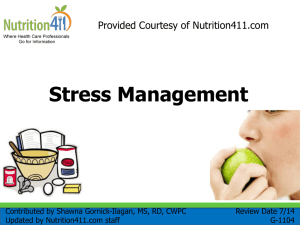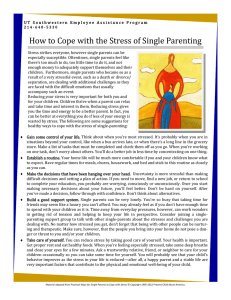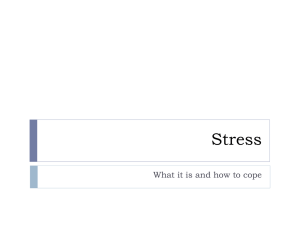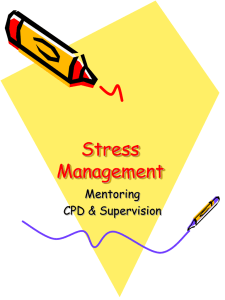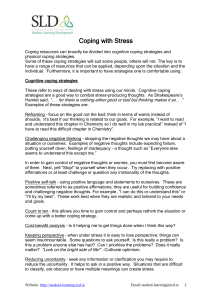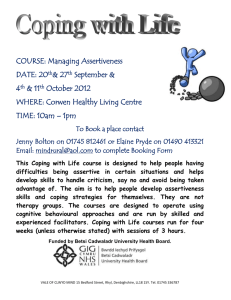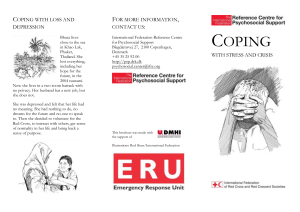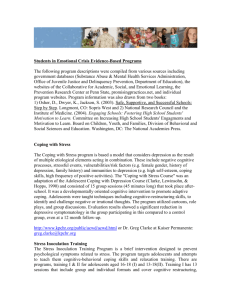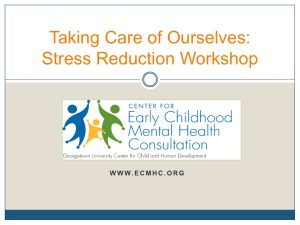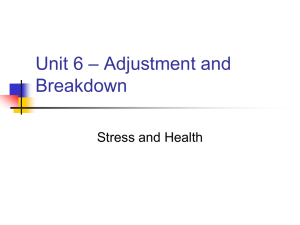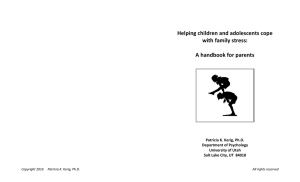Stress Management for College Students
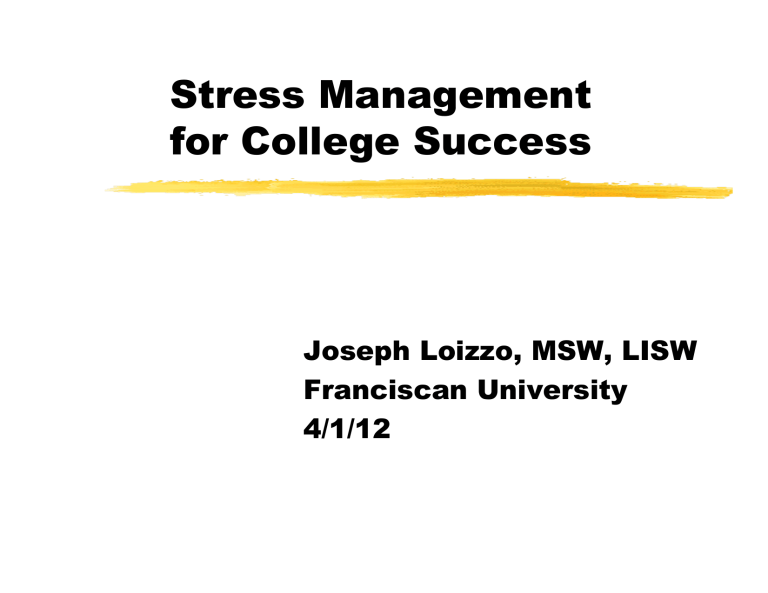
Stress Management for College Success
Joseph Loizzo, MSW, LISW
Franciscan University
4/1/12
What is Stress?
“Flight or Fight Response”
Biochemical process
Stress Response Model- 3 stages alarm reaction resistance exhaustion
Mind-Body Connection
Stress Response Model
General Adaptation Syndrome
Definitions
Stress = the rate of wear and tear on the body both short and long term
Stress means “to draw tight” but with no relief of the tightness it can cause problems
Any change you must adapt to both negative and positive
An everyday unavoidable fact of life
The Impact of Stress
50-80% of all diseases are stress related
25 million people with hypertension
coronary artery disease
increased use of tranquilizers
5-9 million are affected by alcohol abuse
Sources of Stress
headaches
asthma
peptic ulcers
chronic skin rashes
hypertension
palpitations
chest pain
Stress Symptoms
depression
lack of energy
withdrawal from friends
anxiety
crying episodes
poor concentration
forgetfulness
Coping Skills
Negative coping mechanisms
Coping Skills
Negative coping mechanisms
Coping Skills
Positive coping skills avoidance concentration ignore negative self-talk emphasize rational statements
Self Talk-
What is it?
Self Talk
A man is but the product of his thoughts what he thinks, he becomes.
-Mohandas Gandhi
•BE REALISTIC WITH YOURSELF
•AVOID “I MUST” OR “I SHOULD”
•RECOGNIZE WHEN YOU ARE BEING
UNREALISTIC OR UNFAIR WITH YOURSELF
•LOOK FOR THE POSITIVE THING LEARNED IN
FAILURES
•GIVE YOURSELF A PAT ON THE BACK FOR A
JOB WELL DONE!
Positive Attitude Tip:
What you believe has a tendency to become your reality. Using positive thinking techniques, visualizations and affirmations, you may find that it is possible to achieve your goals. Affirmations are first steps, you then have to develop action plans to support your affirmation.
For example, if your affirmation is,
"I am a successful self employed person", you must also develop a plan to support this affirmation. The most important thing with any affirmations is that you first have to believe it is possible!
Barriers to
Managing Stress
1.
“I just ‘deal’ with my stress, it’s not a big issue.”
2.
“It’s just stress, I don’t need counseling”
3.
“Stress is just a part of my job.”
4.
“I don’t have time to deal with my stress.”
5.
“I thrive on stress.”
17
Barriers to Managing Stress
6.
“People who are stressed just can’t cope with reality.”
7.
“If I just make it through these next few weeks
I’ll be OK.”
8.
“I’m so stressed, I don’t even know where to start.”
9.
“Dealing with my stress would just be too expensive.”
10.
“I’m always stressed, it hasn’t made a difference so far.”
18
Making Stress
Management a Priority
Understand the process of how people change
“S tages of Change ”
19
The Five Stages of Change
Stage 1: Nope…Not interested in dealing with my stress right now.
Stage 2: Hmm…I’m seriously considering stress management.
Stage 3: Yep…I’m getting ready to start dealing with stress.
Stage 4: Let’s go…I’m managing my stress.
Stage 5: Old news…I’ve been able to cope
Not Interested in Changing Now
People in this group have no intention of dealing with their stress, and frankly may not even see stress as something they should address.
21
Serious
Consideration
These people understand that finding ways to manage their stress would be good for them, but they aren’t making concrete plans to manage their stress.
22
Getting Ready
To Change…Soon
These individuals understand the benefits of stress management, and are looking at employing stress management techniques in the very near future.
23
Let’s Go…I’m
Taking Action
People in this stage have started to find ways to manage their stress. They’re actually incorporating stress management strategies as part of their daily routines.
24
Old News…Been There,
Done That
These people are successfully managing the stress in their lives. The new strategies they’re using to deal with and address stress have become a normal behavior for them.
25
What Stage
Are You In?
Determining what stage you’re in is an important first step in learning to manage stress. Once you know where you’re at, you’ll be better equipped to cope with whatever life throws at you.
26
Strategies for
Change: Stage 2
I’m Giving Change Serious Consideration
Read, Who Moved My Cheese?
Ken Blanchard.
by
Describe how your stress makes you feel emotionally.
Write down your five biggest stressors.
27
Strategies for
Change: Stage 2
I’m Giving Change Serious Consideration
Speak with a friend who’s experiencing negative health effects as a result of high stress.
At least one time per day, make sure to spend 15 minutes doing something you find relaxing (reading, talking with friends, etc.).
Take a stress self-assessment.
28
Strategies for
Change: Stage 3
Getting Ready to Change Soon
If available, meet with a counselor at school.
Create a written plan to incorporate a moderate amount of physical activity into your routine to help you deal with stress.
Tell your friends and family about your plans to reduce your stress level.
29
Strategies for
Change: Stage 3
Getting Ready to Change Soon
Find a friend who will help you manage your stress. Make sure to develop a plan on how this relationship will function.
Mark a date on the calendar when you will begin a new, less stressed way of life.
Purchase relaxation CD’s and videos to use at home and in the car.
Go online @ FUS/Campus Counseling to download a relaxation program
30
Strategies for
Change: Stage 4
Let’s Go…I’m Taking Action
Enroll in a stress management class to help you achieve your goals.
Regularly update your friends and family on your efforts to reduce stress.
Begin a regular walking program or other exercise program to help you reduce stress.
31
Strategies for
Change: Stage 4
Let’s Go…I’m Taking Action
Create a list of responses that you can use as substitutes to getting stressed out- positive self talk
Take on a new activity like golfing, joining a walking club, or bicycling.
Learn and utilize a stress management technique .
32
Strategies for
Change: Stage 5
Old News…Been There, Done That
Celebrate accomplishing your written stress management plan.
Continue to develop healthy habits in your life beyond exercise and stress management.
Offer yourself as a testimonial to others about the benefits of stress management.
33
Strategies for
Change: Stage 5
Old News…Been There, Done That
Create a list of all the benefits you’ve been experiencing since beginning to manage your stress—be sure to review previous lists and write down how things have changed.
Identify what has been the most helpful resource on your road to managing stress and incorporate more of it into your life (i.e., books, relaxation
CD’s, etc.).
34
Key Point: Change is a Process
Pay attention to all of these change strategies no matter which stage you’re in. Because learning to manage stress is a process, chances are you’ll find yourself in each stage at some point in the process.
35
Organizing Skills
Set priorities
Establish goals- short and long
Don’t over commit yourself
Use daily peak energy periods
Reward yourself for completion of a project or goal
1 . Regular hobbies or interests let off steam!
2. Get regular exercise aerobic and anaerobic
3. Get enough rest
4. Use a relaxation technique
•Foods high in protein, vitamins C,B,A all contribute to protect the body from the effects of stress
•Caffeine rich foods increase the effects as does sugar in general
STRESS REDUCTION: 7 C’s
•Calm
•Challenges
•Choices
•Competence
•Confidence
•Commitment
•Control
Prayer for Serenity
God, grant me serenity to accept the things
I cannot change, courage to change the things I can and wisdom to know the difference.
Living one day at a time, enjoying one moment at a time, accepting hardship as a pathway to peace. Taking as Jesus did this sinful world as it is, not as I would have it.
Trusting that you will make all things right if I surrender to Your will, so that I may be reasonably happy in this life and supremely happy with You forever in the next. Reinhold Niebuhr
When all else fails….
Try this method.
A particularly useful stress management technique:
Picture yourself near a stream ...
Birds are singing in the crisp, cool, mountain air.
No one knows this secret place.
The soothing sound of a gentle waterfall fills the air with a cascade of serenity.
The water is clear.
You can easily make out the face of the person whose head you're holding under the water ...
There now. Don’t you feel better?
